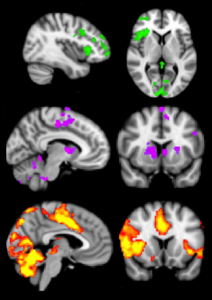Our group aims to apply computational neuroscience to clinical neurology.
Our integrative approach
- We try to break cognition down into its elementary computational steps, asking what quantities the healthy brain must be using.
- Then we try to understand how these steps map on to brain areas and chemicals, e.g. using brain imaging (fMRI, EEG and MEG)
- Next we study how neurological diseases, such as stroke or dementia, can disrupt cognition. This needs detailed, quantitative characterisation of the clinical problem by studying how patients perform carefully designed tasks.
- Finally, we ask whether medications can modify cognition. We are particularly interested in the motivational effects of dopamine and acetylcholine.

Publications
Pubmed (sorted by year)
[publications name=homphysiology]